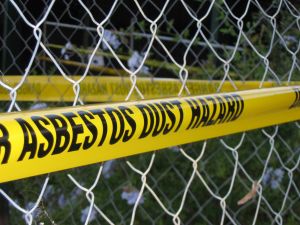The Environmental Protection Agency and its local affiliates have a host of laws to ensure workers who handle, remove or transport asbestos are safe in the process. 
Our Boston mesothelioma attorneys know these kinds of protections came only after years of complaints and scores of deaths directly caused by the fiber.
But now, legislation introduced by Democrat Bill Owens of New York could undermine such progress. H.R. 204, which was presented to Congress on Jan. 4, 2013, would allow the EPA to waive any asbestos standard or requirement under section 112 of the Clean Air Act (42 U.S.C. 7412) with regard to demolition of renovation of a building that has been condemned when there is a reasonable belief that the building may collapse. It’s called, “The Common Sense Waiver Act.”
On his official House of Representatives website, Owns said he was moved to action after, in 2011, he was contacted by local officials in a small village regarding an old restaurant that had fallen into disrepair. The legal owner of the structure had long since gone and could not be located. The leaders wanted to tear it down, as it seemed near collapse, but they could not afford to do so because of the high cost of the asbestos abatement required by the EPA.
On one hand, we can understand where Owens is coming from. If an asbestos-laden building has been abandoned by its owner and ends up collapsing, the dust this could cause might pose a health hazard to the public at-large.
Owens reasons that owners abandon these structures for the same reason local governments have trouble tackling them: It’s expensive. Asbestos abatement, when you follow all the EPA’s rules, can be time-consuming, tedious and costly. So these structures are left to essentially deteriorate.
However, workers safety shouldn’t be compromised under any circumstances. Owens contends that asbestos abatement, in these situations, needn’t be carried out by an experienced, licensed contractor. He goes on to say to a local reporter that while he “hopes” workers will appropriately wrap the material and take it to a proper disposal site, his bill would not make it a requirement.
Everyone from public officials to contractors has said this is a terrible idea. One solid waste department official said that while such work can be cost-prohibitive, the health risks that are incurred by those who handle asbestos are far too great to take chances by bending EPA requirements.
Asbestos abatement contractors said flat-out it would be bad – and not so much for the purposes of their livelihood but for the safety risks that workers would face. Asbestos is a known cancer-causing material. To let just anyone in to start tearing down walls could prove disastrous – not only for the workers, but for the public if the asbestos is not properly handled and safely disposed.
The Common Sense Waiver Act has thus far not gained a great deal of support among Owens’ colleagues. We think that may be a good thing.
If you or a loved one is diagnosed with mesothelioma in New England, call for a free and confidential appointment at (617) 777-7777.
Additional Resources:
Owens’s first bill of 2013 draws criticism, Jan. 18, 2013, By Sean Ewart, Watertown Daily Times
More Blog Entries:
Insurers Expected to Shell Out $85B in Asbestos Claims – $11B More Than Anticipated, Jan. 6, 2013, Boston Mesothelioma Lawyer Blog
 Mesothelioma Lawyers Blog
Mesothelioma Lawyers Blog

